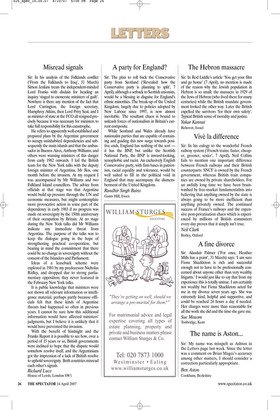Misread signals
Sir: In his analysis of the Falklands conflict (‘From the Falklands to Iraq’, 31 March) Simon Jenkins treats the independent-minded Lord Franks with disdain for heading an inquiry ‘staged to exonerate ministers of guilt’. Nowhere is there any mention of the fact that Lord Carrington, the foreign secretary, Humphrey Atkins, then Lord Privy Seal, and I as minister of state at the FCO all resigned precisely because it was necessary for ministers to take full responsibility for this catastrophe.
He refers to apparently well-established and prepared plans by the Argentine government to occupy uninhabited dependencies and subsequently the main islands and that the ambassador in Buenos Aires, Anthony Williams, and others were warning ministers of this danger from early 1982 onwards. I led the British team for the New York talks with the deputy foreign minister of Argentina, Mr Ros, one month before the invasion. At my request I was accompanied by Mr Williams and two Falkland Island councillors. The advice from officials at that stage was that Argentina would build up pressure through the UN and economic measures, but might contemplate more provocative action in some part of the dependency in early 1983 if no progress was made on sovereignty by the 150th anniversary of their occupation by Britain. At no stage during the New York talks did Mr Williams indicate any immediate threat from Argentina. The purpose of the talks was to keep the dialogue going in the hope of strengthening practical co-operation, but bearing in mind the commitment that there could be no change in sovereignty without the consent of the Islanders and Parliament.
Ideas of a leaseback scheme were explored in 1981 by my predecessor Nicholas Ridley, and dropped due to strong parliamentary opposition; they never featured in the February New York talks.
It is public knowledge that ministers were not shown all relevant information or intelligence material, perhaps partly because officials felt that these kinds of Argentine threats had happened so often in previous years. I cannot be sure how this additional information would have affected ministers’ judgments, but I believe it is unlikely that it would have prevented the invasion.
With the benefit of hindsight and the Franks Report it is possible to see how, over a period of 15 years or so, British governments were inclined to hope that the dispute would somehow resolve itself, and the Argentinians got the impression of a lack of British resolve to uphold sovereignty. Both countries misread each other’s signals.
Richard Luce
House of Lords, London SW1


































































 Previous page
Previous page